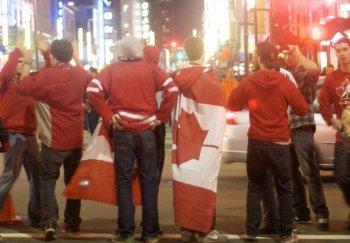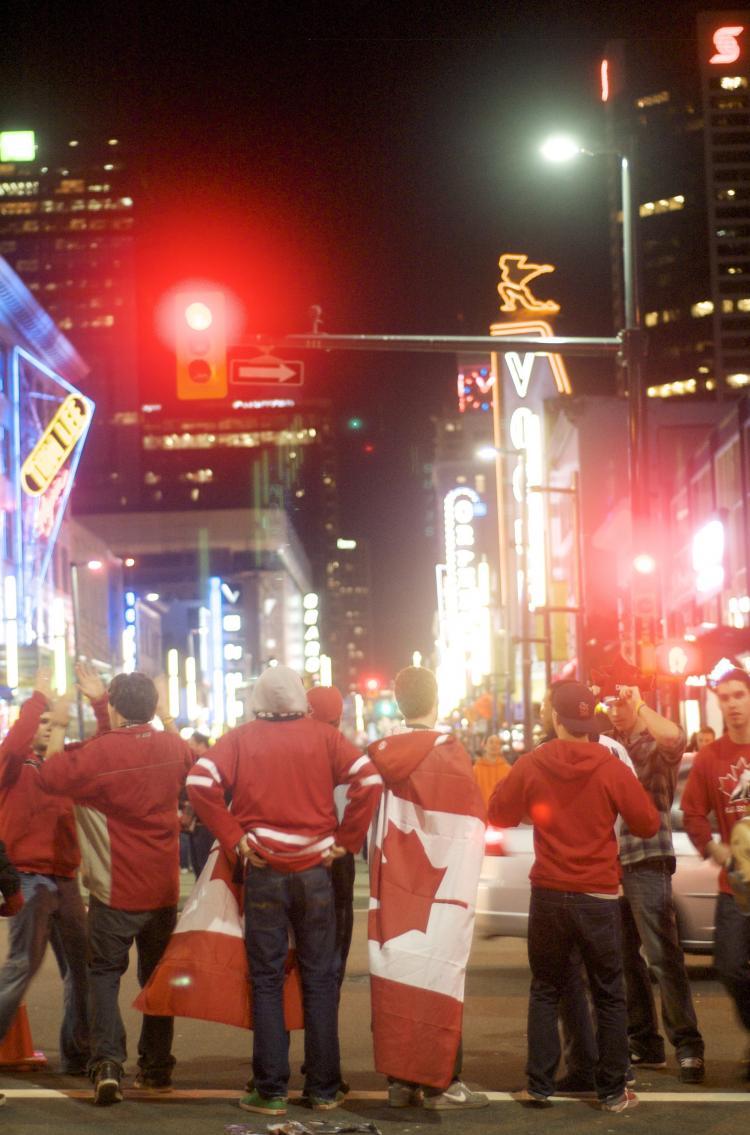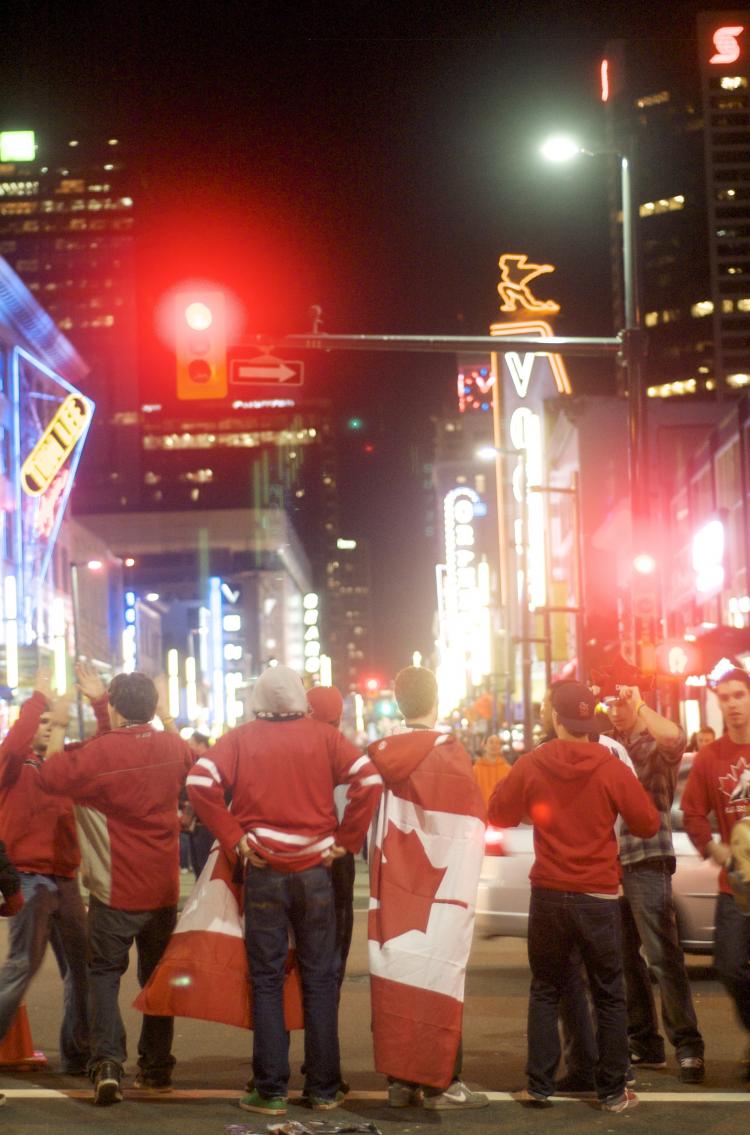VANCOUVER, Canada—Vancouver is a sea of red and white with line-ups stretching down the street to stores selling yet more Canada Olympic paraphernalia.
It may be a love of sports, or maybe just the currently trendy Canada-themed merchandize, but with the city clad in Canada’s colour, there is patriotic fervour here unseen in a generation.
The Superstore at the Hudson Bay in downtown Vancouver has been going “gangbusters” says Timmo Lumme, the International Olympic Committee’s director of merchandising and television.
“Everyone wants to touch a piece of the Olympic spirit to be able to take home with them. Canada is an Olympics-mad nation.”
Renée Smith-Valade, VP communications with Olympics organizer VANOC, says sales of Canada Olympic gear have already doubled what VANOC expected to sell with still five days left in the Games.
It has been a ratings bonanza as well for CTV which paid a mint to broadcast the Games.
Keith Pelley, who heads up the consortium of Olympic broadcasters, says viewership is very dependent on the success of Canada’s athletes and already far beyond expectations with over 97 percent of Canadians tuning in at some point to check out the Games.
“We knew that the Games in your own country transcends sport, we just didn’t anticipate the flood of the patriotic Canadian, which is usually more conservative,” he says.
The Games have galvanized the nation, he adds, becoming “a rallying cry for all Canadians.”
That cry can be heard in the streets of Vancouver nightly, with hoots and howls and cheers of “Go Canada, Go” erupting at any time. Spontaneous renditions of “Oh Canada” are not uncommon.
Laura Moss, Director of the UBC International Canadian Studies Centre, has been in it, and she likes it.
Currently writing a book about nationalism in Canada, Moss, says she has taken part in several events surrounding the Vancouver Olympics and believes there is a change in how Canadians show their love for their country.
What was once an individual display of patriotism, like sewing a Canadian flag on a backpack, has become communal.
“It is a sense of family and community that brings out all the red and white. And I think there is a sense of confidence in being Canadian,” Moss says.
The Canadian government has done its share to try to promote a sense of Canadian identity, partly driven by the concern that the elephant south of the border would gobble up our publishing houses and drown us in American broadcasts. The CBC, National Film Board, and publishing regulations have all aimed to keep that from happening.
But much like the celebrations that mark Canada Day, government efforts to promote Canadian identity are somewhat manufactured and lack the raw emotion on display now in Vancouver.
Moss recounts a tale of her dinner the previous night at a very “funky” sushi restaurant with a fashionable clientele. Even here it was hard to spot someone not wearing Maple; even the most well-dressed person could be seen sporting a Canadian toque, complete with puffy pop-pom.
“It was fascinating just to read the fashion and the clothes. It is a fashion trend as well, the cool kids are wearing Canada right now.”
But what really struck her was the moment the patrons shared when Canadian ice dancing pair Scott Moir and Tessa Virtue struck gold.
“They turned off the funky music ... and then nearly everyone in the room sang the national anthem when it was sung. Even the super-cool bartender was singing at the top of her lungs.”
This, Moss says, was an organic sense of patriotism brought out by getting behind skilled athletes putting their best before the world.
“It is going to be interesting to think of what happens after the Olympics with all the paraphernalia—will it be embarrassing to wear three layers of Canada shirts in March and April?” she wondered.
Moss thinks Canada is well past the stage of defining ourselves by what we are not, rather than what we are. The idea that Canadians define themselves by not being American is “a bunch of crap,” she says.
Andrew Cohen, president of the Historica-Dominion Institute which focuses on Canadian history, identity, and citizenship, is not so sure about that, but does agree that there seems to be a maturation in Canadians’ sense of themselves.
“I think this is an evolution. I think Canadians are prouder than perhaps they have been.”
We’re still a far cry from the United States, he says, where they don’t need the excuse of a national holiday to wave a flag around, but there is a feeling the Games have brought out that Canadians are as good as anyone.
He thinks the character of the country is changing—less British reserve and more expressively Canadian.
“These are the occasions in which people in any country make their patriotic pride known.”
But there have been other chances, says Cohen, that make it look like sports enthusiasm isn’t the only factor behind the sudden surge in Canada love. He points to a change in the importance of Remembrance Day as a sign.
When he worked as a reporter in Ottawa years ago, the ceremony at the cenotaph was not a big deal; now there is a huge attendance.
Cohen thinks there has been a larger process of self-awareness at work in Canada that is now being magnified by the Olympics.
“We are a more self-confident people, we are a richer people than we were. I think there is an insecurity in Canadians as well, I think it shows in how we treat the United States.”
He points to a “narcissism of small differences”—that Canadians define their differences from the United States when there are probably no two countries more alike.
“Canada is complex, it has many sides to its character. A lot of people who are very confident are insecure too—countries are like that too.”
That might explain why the Canada vs U.S.A hockey game attracted the widest viewership of any sports event in Canadian history, with 21.5 million people—nearly two thirds of the country—tuning in to watch at least part.
Prof. Alfred Hermida at the UBC Graduate School of Journalism has been following the patriotic fervour on twitter and other social media.
He says that in that realm at least, it looked more like a celebration of Canadian athletes than a show of patriotism, but looking at the scope of social media, the fragmented nature of these media make it hard to get an overall perspective.
But this method does let a person “listen in” on the type of conversations people are having in the real world. Alexandre Bilodeau’s first gold on Canadian soil was a hot topic at the time, he says.
“I think what the Olympics have done and the fact that Canada has been pretty successful … it has provided a way for people to express their pride in their country and countrymen … I don’t think it is about politics, it is about celebrating those achievements.”
If it’s about celebrating achievements, the fact that those achievements are in the international arena of Olympic competition makes them about success relative to other countries. In this sense, both Moss and Cohen hope there is a transference of that enthusiasm for sports to other areas of significance.
But will this new patriot love lasts when the world leaves Vancouver? Moss thinks at least something will remain.
“I think the lasting legacy will be a shift of individual sense of confidence about being Canadian to a communal sense of confidence.”
“Walking through the seas and seas of people wearing red and white, I will remember forever the sense of being a part of something not politically motivated, the happiness to be a part of a community.”
“I think we will all remember it.”







